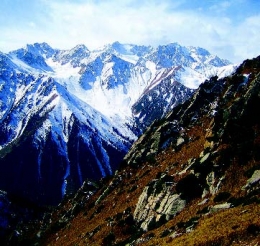Gearóid Ó Cólmáin gets up close and personal with the former Soviet republic at the heart of Asia, strugging to survive amid political power games
I lost my left hiking boot in Kyrgyzstan last week. I know, you’re surprised it didn’t make world headlines! But believe me, it was a deeply traumatic experience.
Kyrgyzstan – which roughly translates as ‘the land of 40 maidens’ – is a land of contradictions and contrasts. A small, poor country fighting for survival in the midst of the great imperial game being played out by Europe, US, Russia and China for control of central Asia’s natural resources.
Arriving in Bishkek airport from Moscow is a perfect introduction to contemporary Kyrgyzstan, as one observes a company of American soldiers heading back to their military base in Manas. Kyrgyzstan is among the most Russian-oriented states in central Asia – hence the American presence.
Making our way to the hostel, my girlfriend and I were accosted by a Kyrgyz lad who spoke little English but much German. He works part-time as a guide for Swiss tourists and wanted to practice German with us in preparation for the next tour, even offering to accompany us for free into the mountains of Tian Shan in the east. We readily accepted, and so the three of us – an Irishman, French woman and young Kyrgyz man – departed for the wilds of rural Kyrgyzstan all speaking German! I felt there was something fittingly peculiar about the whole thing.
On our trip around the country, our guide gave us many insights into the nation’s troubled history. Like Irish, the Kyrgyz language has never attained the same status as Russian, although unlike Gaeilge, Kyrgyz is still spoken by over 60 per cent of the population on a daily basis. Yet most books, signposts and administrative paraphernalia are still in Russian.
Most educated people are perfectly bilingual, but the two unrelated languages operated on two distinct sociological registers. There has been a concerted effort by the government to promote the Kyrgyz language since the fall of the Soviet Union in 1991, but unlike neighbouring Kazakh-stan, where the language is thriving due to ambitious state guidance, the Kyrgyz authorities lack the funds and expertise to translate more books into the native tongue.
Kyrgyzstan also shares an important historical date with Ireland. A few months after Irish revolutionaries had seized the GPO in Dublin’s nationalist rising, Kyrgyz rebels were fighting the Russian Czarist autocracy in the mountains of Tian Shan, bordering China. The rebels opposed conscription to fight in the First World War and were brutally slaughtered by the Czarist forces. As many of the fighters were Bashmachis (conservative Muslims opposed to women’s liberation and modernisation), the Kyrgyz slaughter now known as the ‘Urkan’, or tragedy, was not taught in schools during the Soviet era.
Modern Kyrgyzstan pretty much begins and ends with the formation of the Kyrgyzstan Soviet Socialist Republic in 1936. Before the socialist revolution, Kyrgyzstan was a predominantly nomadic society. The Soviets, however, began a massage education and industrial programme.
Women were forced to burn their hijabs, attend schools and work to build socialism. The Bashmachi revolt was put down, agriculture was collectivised and by the 1950s Kyrgyzstan was a modern and successful industrial republic with universal free education at all levels and a highly advanced free health system.
But since the fall of the Soviet Union, Kyrgyzstan has actually gone backward, in some cases, returning to pre-revolutionary stages, with people using donkeys instead of tractors – unthinkable during the Soviet era. Capitalism promised hope to Kyrgyzstan, and delivered poverty.
As we strolled with our guide Salamat through the many verdant parks of Bishkek, I was struck by so many poignant contrasts. His parents remember the Soviet era with fondness as they had a higher standard of living and less stress. My parents, in contrast, remember the past as a time of greater poverty.
My father came from the so-called ‘free world’ but did not have the money to go to university in the 1950s. Salamat’s father lived in the ‘unfree world’ and had the luxury of free third level education and guaranteed employment.
But now the Kyrgyz are free – free to be poor, free to be unemployed, free to vote for corrupt politicians, free to despair.
As night threw its melancholy cloak over Bishket, my gaze fell on a statue of Marx and Engels, deep in conversation, sitting disconsolately facing the American University of Central Asia, and on the potholed roads that wind through the rugged landscape of Kyrgyzstan, where mosques creep up behind futuristic soviet iconography. It seems that the 40 maidens of Kyrgyzstan have, like me, lost their left boots.












